Part 3 of the Christmas Movie Watchstravaganza
Almost Christmas
Dolly Parton’s Christmas on the Square
It’s a Wonderful Life
The Life and Adventures of Santa Claus
The Polar Express
I promised myself that this year, I wouldn’t just watch whatever Christmas special I happened to spot first on a library shelf or on the airwaves. I’d also set out to watch at least one film regarded as a classic. And I wasn’t disappointed.
If I do what I normally do and start describing the plot of stories I didn’t find too many odd, mockable qualities in, this post’ll be nothing more than a slightly embellished summary. Like a good soup, this post will be more condensed than usual.
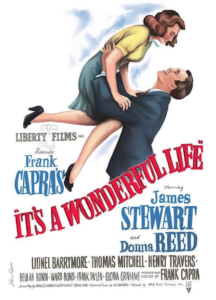
Watching this movie for the first time, you’ll realize surprising things that you just don’t get in the frequent It’s a Wonderful Life parodies and homages in pop culture. Even if you don’t know it by name, you might recognize it as “that Christmas movie where a suicidal man is shown a world where he had never been born.” But what could possibly happen in two hours of runtime that compels people to put it on their Greatest Films of All Time lists?!
First, here’s some trivia: as film buffs already know, this film was originally released as a Not-Christmas movie at some random time of the year. When you watch it, you quickly realize that fifty percent of the film doesn’t even take place in winter! It’s like seeing Scrooge’s whole life before you actually get to his ghostly visitation…! This has the function of making the arc of main character George Bailey’s life more believable, the characters around him more relatable and warmer (or, in a few cases, more evil-er).
So yes: fifty percent of this film is just learning about George’s life. But we’re also doing it from the perspective of a supernatural entity based in a nearby nebula.

Now, when I saw these astral beings exchanging slightly wacky banter, I got scared. Was this movie going to be cornier than I was led to believe?
The answer: no, not really, it’s mostly restrained. There will be a little bit of wacky kid banter, and George’s guardian angel will remain slightly wacky in that “ho ho, what a card!” type of way, but no more than that. We move briskly into George’s early moments of self-sacrifice. The course of his childhood will determine the course of his life.
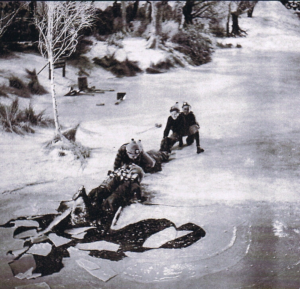
It starts here, on a sleigh ride with friends that ends with him diving into freezing ice to save his drowning younger brother. This isn’t just going to be symbolically resonant—the incident leaves him deaf in one ear, and even that’s going to be important. And not in some convoluted hackneyed way, either. The plot of this film is finely constructed in a way I won’t get far into here: most things, details, and people come back with a vengeance.
Young George continues to develop. He stops the pharmacist he works for from accidentally poisoning a client…and also tries his best to comfort him after the recent loss of his son, a step he didn’t have to take. He gains a righteous fury when he watches his father, the head of a building and loan company, struggle in the grip of the greedy Mr. Potter, who seeks to own all the property he can (while crushing countless people underfoot). Mr. Potter is old, but I believe there’s an old withered phrase about how the cruel ones live long. If he’s 70 now, suffice it to say he won’t leave the mortal plane until at least age 160.
George dreams of traveling the world as a famous architect. Everyone in town knows that after he goes to college, he’ll set off. But his life is one of self-sacrifice—so he delays his education to run the loan company after his father’s death. His younger brother takes his place, gets married, travels. Years grow long.
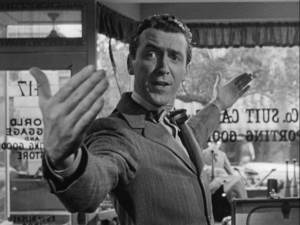
Incidentally, I have a question about this guy’s voice. Is he playing a character, or is that how this actor speaks? Because the guy from Harvey also—oh, shit, that’s the same guy from Harvey? That makes too much sense. Anyway, what is he doing to make that “quintessential 50s guy” voice? (Yes, I know this movie is from the 40s, but pop culture has done a number on my brain.)
…But back to the story. Life continues to move. George gets married himself, and it starts to seem like while he was late in coming to his dreams, they’re in view. They pack their bags, hop in a taxi, and wheel off to a honeymoon in the big city. Just when he sees his out, though, he sacrifices himself again. A mass of people is huddled outside George’s loan company. His wife tells him to stay in the car, but George knows he has to leave. It’s a good thing he does. The stock exchange has just collapsed; this is the eve of the Great Depression.
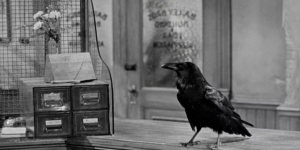
This movie’s story is intertwined with two earthshaking events of the early 20th century: the Great Depression and World War II. George Bailey is made out to be not just a hero to his town, but an unlikely take on the American hero. During the economic downturn, he stays fighting against the robber baron Mr. Potter and his encroaching monopoly (my history book tells me that breaking up merciless monopolies was also “a big thing”). As the nation recovers, he builds homes for immigrants with pride, naming his new suburb Bailey Park. And when the war dawns, his deaf ear keeps him from being drafted—meaning that while his globetrotting dreams are delayed again, he does the hard work at home when resources are tight.
Sentimentally patriotic? It is when I put it that way. But because the narrative is so close-up on George’s life specifically, rather than “The American Narrative” (as if anyone can make that), it doesn’t feel like an overbearing or skewed narrative to me.
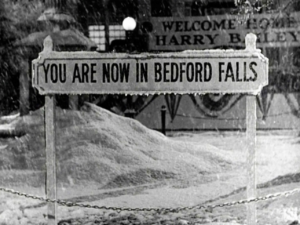
Eventually, it’s almost Christmas, and George is about to make the pleas that attracted the galaxy angel’s attention in the first place. (Remember him?) George’s hapless uncle misplaces a huge, critical amount of money. But it’s not lost; Mr. Potter has stolen it—bitter that George has fought him time after time and never quite lost, knowing how important this lump sum is. George searches everywhere. His temper (another key trait of his, for better and worse—that source of his righteous fury) begins to take over.
In the end, he has no choice but to ask Mr. Potter for a loan to save his company. This is his greatest enemy, but if he can pull out one last moment of kindness…
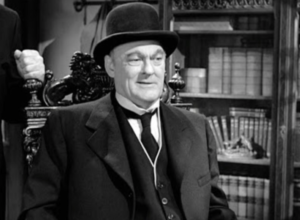
He calls the cops.
Now George is in “I only have a few hours of freedom” mode. He goes home to his family, but he knows that nothing can please him, let alone help him. All the preparations for the Christmas party his wife and children are making are just a cacophony. The fixer-upper house seems uglier than ever. He explodes at them, and then, in shame, goes to a bar—a man punches him. Though seemingly a stranger, this is actually a man George made angry over the phone mere minutes ago. Told you things in this movie come back.
Friendly faces reassure him that that man will never be allowed in this bar again. None of them matter. George drives away, crashes his car, runs the rest of the way to the fateful bridge where he intends to end his life.
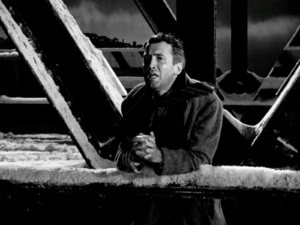
Yes, NOW we’re getting to the part that everyone knows. I hope you see by the fact that I had 0.5 jokes up there that I was on the edge of my seat while I watched these events spill out.
George does indeed jump into the water. But not to kill himself; someone else is in there, apparently drowning. In this moment of self-sacrifice, he has unwittingly pulled his own guardian angel back to shore.
This is Clarence, that wacky angel from earlier, and George relentlessly disbelieves his claims to holiness. In fact, it will take George an extraordinarily long time to believe anything Clarence says is true. When George says “I wish I had never been born” and Clarence says he’ll take him up on that offer—show him just such an alternate reality—George acts like he didn’t hear that. When George wanders the streets of a changed Bedford Falls, he talks to everyone he once knew, over and over, as if they did know him. But they don’t, and he is…
Irritating for the audience to watch, because they’ll lose patience with him for ignoring a convention that we think he should have expected by now?
Years and years of paranormal fiction have accustomed us to certain genre expectations. If a character is in a weird situation, sure, it makes sense for them to say, “Is this all just a dream?” But we don’t want them to keep saying that ten, twenty, forty minutes into the plot. If the movie The Life and Adventures of Santa Claus weren’t made for kids, the fact that young Claus tries not once, not twice, but three times to interact with humans while in a ghostly form would be overkill. “We get it!” the whole audience would say.
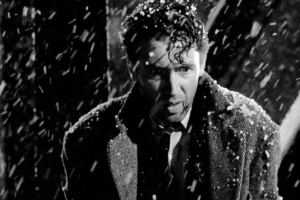
So why doesn’t George get it? Well, first of all, this film was made in 1946. They didn’t even have The Twilight Zone back then. Viewers’ suspension of disbelief was a different beast, and the notion that an “all just a dream” ending could be poorly received was apparently not in full enough force that The Wizard of Oz couldn’t famously use it.
But I propose a second reason. In It’s a Wonderful Life, the fact that George won’t stop talking to people as if he knows them is the whole point. Him “stalling the plot” becomes the plot. He’s no longer desperate to die. He’s not desperate to escape other people. He’s desperate to be recognized by others. Humanity is shutting him out, and while it’s not one-to-one equivalent with how he screamed at his family and friends earlier this very day, it still holds a mirror up to him.
His first lesson to learn in this alternate world isn’t that his birth was a wonderful thing. It’s that he can’t stand being alone. He wants to be with those he loves again—only then can he get to the second step: enriching their lives.
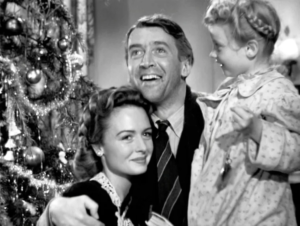
Like Scrooge after he sees his ghosts, George returns to life in a joyful, profoundly thankful mood. When he comes back home and sees the cops investigating, he greets them, just as chipper. He beams at his family. He’s accepted his fate, whatever it may be.
But then the real miracle happens, and I think it’s pretty grounded. In fact, even people who find Scrooge’s about-face too unbelievable might root for this one, because the happy ending is the result of all the good deeds George has done over the course of a life.
A stream of townspeople comes through the door, contributing money to replace what his uncle had lost, what Mr. Potter had stolen. Things are paying off quite literally, not to pay for like an expensive yacht but to rescue George from a life sentence. What’s more, people who work/ed for Mr. Potter contribute too!
Then there’s the famous ending line…
What Is This Shit About A Bell Ringing
Alright, so the line is, “Every time a bell rings, an angel gets his wings.” This is what George’s cute child Zuzu says shortly before the end of the movie. It’s not just a nice sentimental thought about the Christmas ornaments on the tree. It’s also a callback to something Clarence said at the evil, paradox version of the bar—only he said it when a cash register chimed.
That moment threw me for a loop. It threw George for a loop, and unlike his constant disbelief in Clarence’s superpowers, I’m totally with him. Why would Clarence say such a cockamamie thing as that? So every time a cash register at a den of sin opens and accepts another purchase, an angel succeeds at a personal assignment and thus ascends to heaven? Need I remind you this is Clarence the adult angel who first said this, not some child. He’s supposed to know better.
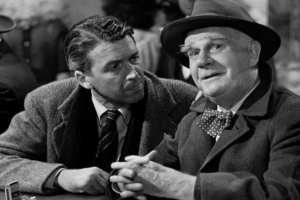
Well, the story is otherwise so well-tuned that I don’t think this was just a random oversight or a misplaced moral. Since I refuse to look up anybody else’s answers (and I’m sure there are), I’ll make like Descartes and use sheer reason to solve this conundrum.
You see, money is said to be the root of all evil. Charity is a Christian virtue, avarice a sin. Now, this movie is all about a dude who runs a loan company. Loans are often predatory. Loan sharks exist. Mr. Potter makes very crappy loans. Loans are a quintessential way to con the little guy.
But George has never succumbed to the evil power that loans so often have. He’s a capitalist hero in an unusual sense (and in that way, again, very American). With his money, twisted into a tool for good, he constantly proves his own morality. Thus, every time a cash register rings, good people are tested and the best of them ascend.
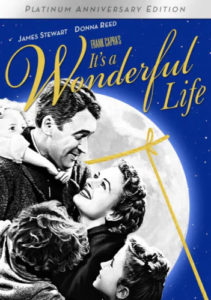
Did you know? I watched this movie colorized by mistake. It was not advertised as such on the box. My DVD copy was seriously just a “platinum anniversary edition,” and to make matters worse, the image on the box IS IN BLACK AND WHITE! Now That’s What I Call Deceptive™. Apparently, though, the director himself ordered this movie colorized soon after release, meaning it wasn’t done by a total outsider as I expected.
That’s not a dealbreaker, of course, but it does mean that throughout the film, I was making color associations that the original filmmakers did not intend, at least not at the time of filming. For example, did you know that the walls of the loan company are…green? Which is also the color of money? And that the colors of the flowers are pink, like all the dresses worn by that one lady who tries to woo George, but actually he marries the other lady, the one who got stuck naked in the thorny bush because George wouldn’t give her back her robe, because I guess all films made before a certain date needed a certain level of distressing romantic back-and-forth? And George’s flying-ace younger brother also takes the family’s Black maid into the side room and closes the door, where it is implied that he “comically” forces himself upon her and they have muchas smoochas?
Phew, I finally found a place to mention that. Also, Mr. Potter’s office contains a miniature skull and a bust of Napoleon. All I can say to that is a genuine “wow.”
Speaking of “Wow” and “Genuine”
It’s a Wonderful Life is a sincere and moving film that in my opinion deserves its status as a classic not only among Christmas films, but among films in general. It reminded me of the power of monologues, following through on morals we take for granted or that almost seem too obvious to be spoken (like “greed is bad”), and acting with real conviction.
…Now I have to go back to watching weird shit
Thank you for reading, and Patrons, thank you for Patreonning.
If you want to read more about slaying old demons, here’s my post about following through with commitments, and my other one about, um, following through with commitments. But don’t worry. You can also read about more Chrimbus action:
Almost Christmas
Dolly Parton’s Christmas on the Square
It’s a Wonderful Life
The Life and Adventures of Santa Claus
The Polar Express
